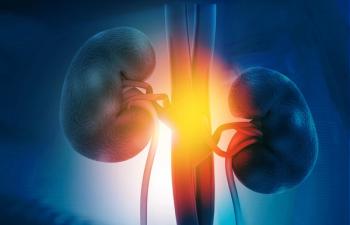
Stereotactic Ablative Radiotherapy Effective Option for Primary RCC
Use of stereotactic ablative radiotherapy effectively treated patients with primary renal cell carcinoma and had an acceptable effect on patient renal function.
Use of stereotactic ablative radiotherapy (SABR) effectively treated patients with primary renal cell carcinoma (RCC) and had an acceptable effect on patient renal function, according to the results of a pooled analysis
“Just as patients who have comorbid medical conditions now receive standard treatment with SABR for early-stage lung cancer, a similar paradigm could unfold in patients who have RCC,” wrote Shankar Siva, MD, PhD, MBBS, of Peter MacCallum Cancer Centre at the University of Melbourne, and colleagues. “The current large-scale, individual patient pooled analysis marks an important step in advancing this new paradigm, demonstrating a favorable toxicity profile and excellent oncologic outcomes.”
The 5-year survival of patients with RCC who are unable or unwilling to undergo surgery is significantly worse than that of patients who undergo partial nephrectomy. Research is ongoing to find better treatment options for these patients. One of those options is SABR, which has been established in the treatment of other solid tumors such as lung and liver cancer.
In this study, the researchers pooled data on 223 patients from 9 International Radiosurgery Oncology Consortium for Kidney institutions; 118 patients received single-fraction SABR and 105 received multifraction SABR.
There were excellent rates of local control (97.8%), cancer-specific survival (95.7%), and progression-free survival (77.4%) at 2 years. At 4 years, these rates were mostly maintained at 97.8%, 91.9%, and 65.4%, respectively.
A multivariable analysis showed that larger tumors and receipt of multifraction SABR were associated with poorer progression-free survival (hazard ratio [HR], 1.16 and 1.13, respectively) and cancer-specific survival (HR, 1.28 and 1.33, respectively).
“By contrast, although patient age and Eastern Cooperative Oncology Group performance status were not balanced between groups, these factors were not independently prognostic of survival outcomes on multivariable analysis,” the researchers wrote. “The association of fractionation with progression-free survival and cancer-specific survival was not explained by decreased local efficacy, because local control was similarly excellent for both regimens.”
Overall, the treatment was well tolerated, with grade 3/4 toxicity occurring in 1.3% of patients. There was also good preservation of renal function after SABR in this study. The mean estimated glomerular filtration rate at baseline was 59.9 mL per minute and it decreased by 5.5 mL per minute (P < .01).
“Local control, minimal complications, and preserved renal function are considered to constitute ‘the trifecta’ after minimally invasive partial nephrectomy,” the researchers wrote. “The current multi-institutional, pooled analysis marks an important step in demonstrating that SABR can achieve this trifecta in localized RCC.”
Newsletter
Stay up to date on recent advances in the multidisciplinary approach to cancer.















































